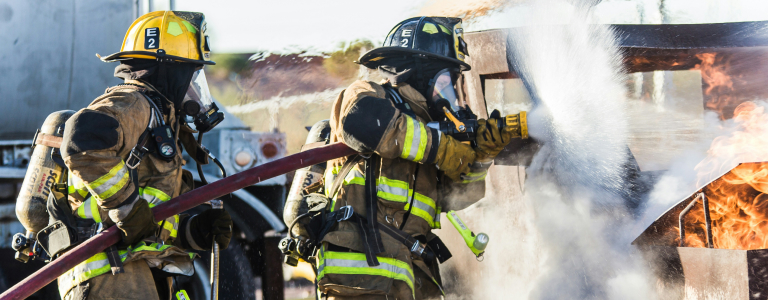Fire Science Technology

Overview
The Associate of Science in Fire Science Technology program is designed for individuals interested in a career in the fire service field and provides experienced firefighters with the opportunity to enhance their job skills. This program not only builds a foundation of the necessary skills for employment but also provides advanced skills in areas such as new technologies, emergency scene operations, and leadership. This is a comprehensive degree program which broadens the students’ knowledge base and teaches “real world” skills in order for first responders to meet the demands of the public not only today but in the future.
Program Outcomes
Upon the successful completion of the program, students will be able to:
- Explain fire dynamics, prevention, and fire loss.
- Examine strategies, tactics and theories used to safely and efficiently resolve emergencies.
- Implement fire protection strategies and practices to realistic scenarios.
- Develop leadership skills to safely lead emergency personnel during manmade and natural disasters.
- Apply theories of prevention to develop a safe community.
Fire Science Technology Courses
-
Code
Course
Credits
-
- FST 101
Principles of Fire Protection
- 3
-
- FST 112
Fire Department Equipment & Systems
- 3
-
- FST 124
Building Construction
- 3
-
- FST 132
Health and Safety for First Responders
- 3
-
- FST 203
Arson Investigation
- 3
-
- FST 215
Fire-Ground Hydraulics
- 3
-
- FST 222
Psychology and Mental Health for the First Responder
- 3
-
- FST 242
Strategies & Tactics on Emergency Scene
- 3
-
- CJS 103
Criminology
- 3
-
- CJS 105
Criminal Evidence & Investigation
- 3
-
- CJS 117
Crisis Intervention & the Police
- 3
-
- CJS 121
Criminal Procedure
- 3
-
- ENG 101
English Composition I
- 3
-
- ENG 102
English Composition II
- 3
-
- EMS 101
Emergency Medical Technician- Basic
- 6
-
- CHE 103
Introduction to Forensic Science
- 4
-
- HSV 201
Counseling Skills
- 3
-
- HSV 251
Introduction to Substance Addiction Studies
- 3
-
- SOC 112
Interpersonal Communication
- 3
You might also be interested in...
-

Physical Therapist Assistant
The Physical Therapist Assistant Program at Quincy College prepares students for licensure and employment as Physical Therapist Assistants.
-

Emergency Medical Technician (EMT)
Students learn medical and traumatic emergencies, childbirth, rescue extrication, ambulance operations, medical-legal implications, and AED/CPR.
-

Paramedic Education
A 16 month program that includes didactic, skills laboratory/scenarios, clinical internship, and capstone field internship.
-

Criminal Justice 3+1 Joint Admissions Program
Quincy College’s Criminal Justice 3+1 program offers joint admissions with Curry College, allowing students to complete an Associate’s and Bachelor’s

